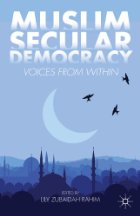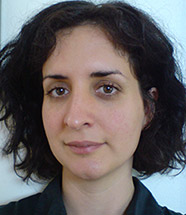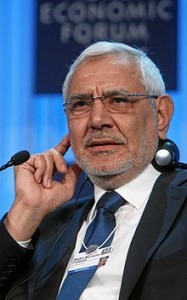 Exactly one week before the Egyptian military’s removal of the Morsi government I received a copy of Muslim Secular Democracy: Voices from Within, edited by Lily Zubaidah Rahim. One of my particular interests at the time was in Turkey and I posted some interesting observations in the book about the Muslim government there: Can Democracy Survive a Muslim Election Victory? (That chapter raises the question of how valid are the fears of Muslim victories in democratic elections. The way the Muslim party has ruled in Turkey provides an instructive contrast with what happened recently in Egypt.) Other posts discussing Rahim’s book are archived here.
Exactly one week before the Egyptian military’s removal of the Morsi government I received a copy of Muslim Secular Democracy: Voices from Within, edited by Lily Zubaidah Rahim. One of my particular interests at the time was in Turkey and I posted some interesting observations in the book about the Muslim government there: Can Democracy Survive a Muslim Election Victory? (That chapter raises the question of how valid are the fears of Muslim victories in democratic elections. The way the Muslim party has ruled in Turkey provides an instructive contrast with what happened recently in Egypt.) Other posts discussing Rahim’s book are archived here.
This post has been sitting half or less done in my drafts for some weeks now, and since the Egyptian military removed Morsi this post feels very academic and pointless ancient history. Patrick Cockburn’s view that Egypt has begun to enter a new dark age with the forces that had backed Mubarak’s bloody dictatorship more entrenched than ever.

Anyone following Egypt’s events in any detail will not find anything new here. The author is Tara Povey. Her chapter is titled Voices of Dissent: Social Movements and Political Change in Egypt. There is an earlier version of this chapter (published before Tara Povey moved to the University of London, and so not with the same details I cover in this post) here. Tara’s chapter in Muslim Secular Democracy is a much revised and augmented version of that online post. But let me post one section from it that overlaps with the new print chapter:
Islamic movements are generally portrayed in the West as undemocratic and are equated with terrorism and Islamic fundamentalism.
In reality they are far from being homogenous and uniformly conservative.
Islamic reformism, modernism and dynamic jurisprudence have a long history in the region, beginning in the 19th century when reformers sought to strengthen and reform Islam and oppose colonialism. Today, diverse Islamist frameworks exist which are not based on opposition to the ‘West’ as a whole but rather oppose the West’s support of undemocratic regimes, the prosecution of wars in the region and highlight the importance of a society founded on the principles of social justice and equality.
In many parts of the Middle East and North Africa, Islamic groups have participated in t he democratic process and are playing the role of a genuine political opposition.
Since the 1990s a number of Islamist movements such as the al-Nahda movement in Tunisia, the Muslim Brotherhood, Hizbullah and HAMAS have entered electoral politics and have actively campaigned for democratic reform. This has prompted one author to note that in some countries Islamist movements “have been more strident in pressing for democratic change than have non-religious political parties.” Women’s activism has played a vitally important role in these movements and diverse strands of Muslim and Islamic feminisms have been formulated through which women have fought for gender equality as well as democracy, social justice and freedom from foreign domination. (my bolded emphasis.)
After the fall of Mubarak Western and other pundits were expressing fears that the events would lead to the takeover of Egypt by the MB.
The forces involved in the uprisings, however, says Tara Povey, “have been broader than any one organization or political party.”
Povey explains that the events surrounding the removal of Mubarak have forced out into the open generational and ideological splits within the MB.
Note:
- The leadership of the MB was initially unsupportive of the protests against Mubarak, with its conservative leadership often calling on Egyptians to stop striking and protesting and to maintain order in the country.
- Despite these calls by the MB leadership, many thousands of MB members participated in the demonstrations and strikes that brought down Mubarak.
- They were vital in organizing food, water, and safety for the protestors in Tahrir Square when they were attacked by the regime. (p. 243)
- During the May protests crowds chanted “Tahrir is here! Where is the Brotherhood?” MB’s youth membership accused their leadership of being “out of touch.”
- After the May protests Povey writes that the MB “announced the expulsion of one of its most prominent leading activists, Abdel Moneim Abu al-Fotouh, who had played a major role in leading the group’s civil society and student activism.”
- Abdel Moneim Abu al-Fotouh was also associated with a group of prominent leaders who were involved in articulating a liberal Islamist orientation for the organization, a position that has been popular at the grassroots level of the MB.
- After his expulsion a group of young activists, including a prominent youth leader of the organization Mohamed Affan, broke away from the MB to form Hizb Al-‘Tayyar Al-Masry (the Egyptian Current Party). (p. 243)
There is more on “Abdel Moneim Aboul Fotouh” on Wikipedia:
Known for liberal Islamist views, as a leader within the Muslim Brotherhood, and a stress of social justice, Abou al-Fotouh claims to have worked to ensure that the ideas of the Muslim Brotherhood conformed with democratic principles. He declared on the BBC that the source of true power and legislation was not in a law or constitution but in the people.
See also a fuller biography on ahramonline.

Longstanding divisions in the Moslem Brotherhood
- Economic policy
- the leadership’s previous support for infitah and business class interests are anathema for MB members who see Islam as a just and equitable system
- Social policy
- The Freedom and Justice Party (launched April 2011): its platform proclaimed that women and Copts were to be excluded from the presidency despite having rights to participate fully in political life of Egypt.
- “Those Islamist activists who oppose it argue that it contradicts a growing body of Islamist thought in the region that is based on a dynamic jurisprudence and the formation of religio-political frameworks founded on equality and justice.” (p. 244)
- The Freedom and Justice Party (launched April 2011): its platform proclaimed that women and Copts were to be excluded from the presidency despite having rights to participate fully in political life of Egypt.
- Position of Egypt vis-à-vis USA and Israel
- debates over Egypt’s acceptance of massive aid and military funding from the USA; the peace treaty with Israel; the blockade on Gaza
Popularity of the Muslim Brotherhood
That the MB has wide support is evident from the facts that:
- The MB won a majority of seats in the parliamentary elections in December 2011
- Morsy/Morsi won the presidential election in June 2012.
Povey explains that his is not at all surprising given the MB’s lead in civil society over the past 20 years. It is also partly explained by a more general disillusionment with the traditional secular and leftist opposition movements and parties.
Indeed the crisis of the left can be seen in the fact that some secular left groups supported the regime’s presidential candidate, Ahmed Shafiq, as a bulwark against the MB. (p. 244)
The Morsi government
As has been widely publicized now, Morsi’s government was confronted with many serious issues, the common narrative being that it failed to reach out to other groups. Among some of the more serious problems arousing the greatest opposition (including among former MB supporters) were the government’s
- signing of a new deal with the IMF requiring further neoliberal reforms
- perceived weak response towards Israel’s airstrikes in Gaza
- the constitutional declaration
Tara Povey concluded with words that, in the light of recent events, now seem irrelevant and even naïve:
It is oversimplistic to argue that these events vindicate the notion that democracy in Muslim majority countries will necessarily lead to Islamist parties in power or that the membership of these parties will agree on a conservative political and social agenda. Events in Egypt rather reflect the contestation of political space by the leadership of the MB which should be seen as distinct from its diverse membership, elements of the old regime, and social movements. Millions of both religious and secular Egyptians have participated in social movements of workers, civil society activists, women, the poor, and the young over the last decade. They now oppose the continuance of “business as usual” in the country. (pp. 244-245)
Not sure why I posted this. It was begun before the Egyptian military reenacted their version of Algeria, 1992. The post reads more like a faded epitaph now.
If you enjoyed this post, please consider donating to Vridar. Thanks!

Muslim Brotherhood. Link to insightful article written by someone who knows what they are talking about.
http://web.archive.org/web/20150212224755/http://blogs.euobserver.com/debeuf/
I am not a Muslim; I am not an Islamist and my ideal is a secular society. Yet Muslims have a right to organise politically, even as Muslims if they want to. The freedom and Justice Parties in Turky and Egypt are basically Conservative parties like the Christian Democrats in Europe. In Turkey Erdogan has said that while he is devout a political party can not have a religion. Like European parties their basic alliegance is to the U.S.A. and in the case of Erdogan it was this that finally persuaded him which way to jump over Libya and Syria. This support for the violent obscurantist and sectarian (anti-Shia, anti Christian, anti human) Saudi and Quatar backed opposition movements does not justify a military coup – else it would justify coups in Britain and France!
The deep state in Egypt and Turkey is rather more grounded than the equivalent anti democratic movements in Europe (the mix of self styled aristocrats, right wing intellectuals, disaffected members of the army and the secret services which formed the basis for instance the Blueshirts in Ireland and even a ridiculous conspiracy against Harold Wilson in England, and of much more sinister activities in Italy and Greece). The deep state is more grounded because it can pose as the heir and Guardian of revolution- protector of secularism, Kemalism, or Nasserism. But this is just pretence. These elements were entirely taken over, subverted, and corrupted during the cold war by the C.I.A. and now serve U.S. government aims above all. The Egyptian army indeed, which controls 30% of the Egyptian economy, is paid for by U.S. “aid”.
There are Muslims who believe Islam has something to offer in achieving a more just society. Tragically it is now too late to bring the rank and file of the Muslim brotherhood into alliance with secular reformers. It is when real refoms become impossible that Islamic movements turn to sectarian demagogy. Morsi’s tolerance of anti Shia rhetoric is now balanced by the present Military leaders lies about the Palestinians of Gaza.
What is now happening in Egypt is tragic. Look back at the history of Algeria. Anticipate the consequences for the whole region.
Leftists and liberals who support the military takeover as a “peoples’ coup” should be ashamed of themselves. What we have been seeing is massacres and murder of unarmed people, now lies about conspiracies and prisoners ” shot while trying to escape”. Are these “peoples’ massacres”, “peoples’ Murders” ? Can we have no feelings of humanity for our political opponents?
A must-view set of interviews by anyone wanting to understand the media dynamics behind what “we” are hearing and seeing vis-a-vis what Egyptians are seeing and hearing on their media about these events: http://www.aljazeera.com/programmes/insidestory/2013/08/20138205493240813.html
An interview with reps of 3 viewpoints: an Egyptian Sisi regime supporter, an MB spokeswoman, a journalist for the independent: http://www.aljazeera.com/programmes/insidestory/2013/08/201381972825155116.html , with a view of why ordinary Egyptians are being portrayed now as terrorists: http://www.informationclearinghouse.info/article35922.htm . . .
Interviews with specialists on the broader region that helps us see the wider context, and concludes with a suggestion that the Arab world (with its imperialistically dictated boundaries and clumping of groups into set nation-groupings) is finding itself now where Europe was at the beginning of the twentieth century: http://www.abc.net.au/radionational/programs/latenightlive/middle-east-meltdown/4899262
And now for MB 2.0 — http://tinyurl.com/mloonrr — How the youth are taking over the leadership of the Muslim Brotherhood now that its older leaders have (for most part) been arrested, and the changes that may bring . . . .